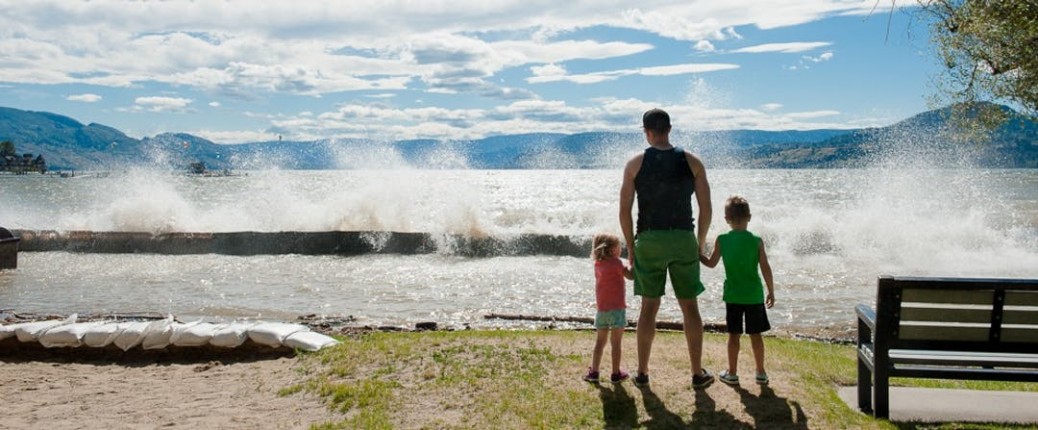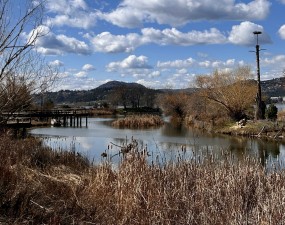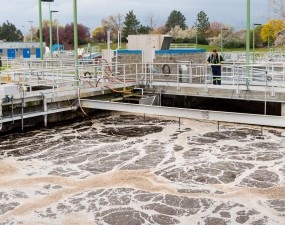Building a Climate Resilient Kelowna
Topics
By Chris Ray, Climate Action and Environment Manager, City of Kelowna | May 31, 2024
It may be cliché, but I’ve been passionate about climate action since I was a teenager and watched the documentary, An Inconvenient Truth, which highlighted the need for immediate action on climate change. Unfortunately, the call for urgent climate action hasn’t changed since that film was released in 2006. Now, especially as a parent, more than ever I see how we all need to be part of the solution and work together to ensure the best possible outcomes make for our kids and future generations.
I don’t take that responsibility lightly, especially in my work with the City of Kelowna. With climate and environment as a priority of City Council, we are advancing that priority, including the formation of the Climate Action and Environmental Stewardship Department last year and a new community climate action plan nearing completion. We still have a lot to do, but these efforts show that the City is determined to tackle the challenge head-on. Check out our recently released Year 1 2023–2026 Council Priorities progress report at council.reporting.kelowna.ca to learn more.
A long history of climate action
Addressing climate change is not new at the City, as we’ve had two previous community climate action plans (2012 and 2018) that focused on reducing greenhouse gas (GHG) emissions. But now, as the local effects of climate change increase with extreme weather and more wildfires, droughts and floods, it’s time we take bold action. Not only in amping up our GHG emissions reduction targets, but also by adapting to the changing climate that we are seeing more often and intensely. This way we can be better prepared and resilient for what is to come.
The Climate Resilient Kelowna Strategy
We are working on a new strategy that follows a low-carbon resilience approach to help our community reduce the GHG emissions that cause climate change (mitigation) and get ready for the changes we expect to face (adaptation). Called the Climate Resilient Kelowna Strategy (CRKS), it includes valuable insights gathered from extensive public engagement, research on best practices and approaches used by other jurisdictions, as well as modelling and analysis. Once our final round of public engagement is completed in June, the CRKS will be finalized and include upwards of 138 actions for both mitigation and adaptation.
Mitigation and adaptation, an integrated approach
Mitigating and adapting to climate change are two interconnected efforts that are crucial for addressing the challenges posed by a changing climate. Kelowna’s three biggest sources of GHG emissions are transportation, buildings and waste. These areas are where mitigation efforts such as improving transit options, expanding our active transportation network, decarbonizing existing buildings, and adopting more impactful energy-efficiency and emissions requirements in new construction through the BC Energy Step Code and Zero Carbon Step Code will have the biggest impact in reducing GHG emissions.
However, achieving our city’s GHG emissions targets will not eliminate the effects of global climate change overnight. We also need to adapt to its effects and be prepared for the inevitable changes we are already starting to see. Steps the City is taking include increasing the urban tree canopy to reduce the urban heat island effect on hotter days (which also supports GHG emissions reduction efforts), flood protection on major creeks, and supporting regional emergency response efforts.
You can help as well, by making your home or business FireSmart® and having a grab-and-go emergency kit so your family is prepared for wildfires and other emergencies. To help reduce your GHG emissions and make your home or business more resilient to climate change, consider making energy-efficient building upgrades (e.g., new insulation, windows, or a heat pump). Or reduce your personal transportation emissions by commuting using active modes (e.g., bike, walk, roll) or transit.
One of the initiatives we recently launched that I am most excited about is the Home Energy Navigator Program. It provides free support to guide you step-by-step through the home energy retrofit process. If we can reduce some of the complexities of the process it will help to maximize your financial savings and make your home as energy efficient as possible.
The Co-Benefits of Climate Action
Aside from benefits to the climate, in many cases, actions that reduce GHG emissions correspond or directly overlap with actions that create vibrant and resilient cities and towns, improve public health outcomes, reduce government operating and capital costs, and support innovation. In other words, these are no-regrets policies that have multiple co-benefits beyond addressing climate change.
For example, we know from the pandemic that when fewer vehicles are on the road there is an immediate positive impact on air quality. While no one wants to repeat the conditions of the pandemic, there is proof that changing transportation patterns can simultaneously produce fewer emissions and improve our local air quality. Some households might have even saved money on their daily travel.
There are also a lot of things happening at the City that may not be labelled as climate initiatives but do have climate benefits, such as components of the Transportation Master Plan focused on active transportation and transit; and the Official Community Plan’s focus on growth in the Urban Centres and Core Area. The CRKS is not just about creating new initiatives, it’s also leveraging what we’re already doing.
See How We’re Doing, What We’re Doing and What’s Next
To reach our targets we need you! We want to support and collaborate with community members to help make it easier for everyone to make low carbon choices in their daily lives.
Our final engagement for the CRKS began on May 15 and will run until June 9. You can Get involved by sharing your feedback. Keep track of our progress at opendata.kelowna.ca/pages/progress-reports.







